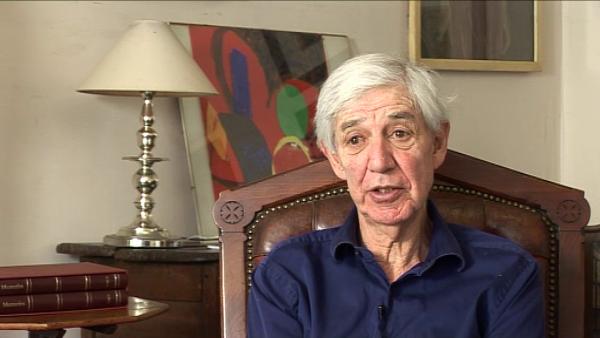NEXT STORY

Belief in cause and effect is what makes us human
RELATED STORIES

NEXT STORY

Belief in cause and effect is what makes us human
RELATED STORIES


|
Views | Duration | |
|---|---|---|---|
| 11. Sydney Brenner and Francis Crick | 530 | 03:29 | |
| 12. French Flag Model | 902 | 01:11 | |
| 13. Reaction diffusion theory that goes back to Alan Turing | 497 | 03:41 | |
| 14. Amata Hornbruch and colleagues at the Middlesex Hospital Medical... | 281 | 02:33 | |
| 15. Controversy over positional information | 277 | 02:11 | |
| 16. Left-right asymmetry | 292 | 01:44 | |
| 17. Being elected a Fellow of the Royal Society | 281 | 07:46 | |
| 18. My theory on the evolution of multicellularity | 280 | 01:10 | |
| 19. Cognitive therapy treatment for my depression | 1 | 610 | 03:44 |
| 20. Belief in cause and effect is what makes us human | 373 | 04:46 |


With my depression I ended up in the Royal Free because I was suicidal, and I was there for three weeks and they looked after me very well. I was given an antidepressant, I can’t remember which one it was at that particular stage, it made me feel a little bit better, and they just started me on cognitive therapy, which didn’t work. I couldn’t understand what they were talking about at that stage; I was very severely depressed. And I think the antidepressant helped me a bit, although I’ll come back to that in a moment and then cognitive therapy. And cognitive therapy is fortunately nothing like psychoanalysis. What cognitive therapy is about, is to try and help you get rid of all your negative views. One of the main features about depression is you have negative views about almost everything. And what the cognitive therapist tries to do, is to show you that many of your negative views are wrong. So, for example — a classic example — not in my case but where the... the therapist says... where the patient says, ‘Nobody loves me’. And the therapist says, ‘What about your dog?’ and the patient says, ‘Yes, my dog does love me’. Now, you may think that’s trivial, but anything that makes you reconsider one of your negative things, is a step forward in the right direction. And I know... I know it’s very difficult but that’s the way things can... can move forward.
I did at one stage — at a much later stage — I had another depression after I’d recovered and the person I was with said that she would not help me unless I had psychoanalysis. And so I went into psychoanalysis and that didn’t help me at all. And he said, ‘You’ll never recover without my help’, at £94 a session, and fortunately he went on holiday and I did leave, I didn’t go back. But with psychoanalysis, you know, it’s really psychobabble and it doesn’t help at all. It’s not like cognitive therapy at all. Cognitive therapy, you keep a diary. Keeping a diary is very important, because, for example, the therapist can look at your diary and say, ‘You keep saying you’re never going to get better, but look, last Thursday, you did feel better’ and you say, ‘Gosh really, I... I did feel a little better’ and that does make one, you know, it... it does lead to improvement. And I began to get better with my depression, and I was very nervous about going back to work and what I did with the cognitive therapist... we had a discussion as to what would happen. We, sort of, had a almost had, like, a little play that if I went back to work and felt back... too bad at the meeting, what would happen if I walked out? And I realised it wouldn’t be that bad and I did go back and I didn’t walk out and if you make a step forward like that, then you’re really on the way to getting better. And eventually my depression got better and I’ve had minor occurrences over the years and in fact, I’ve just come off my antidepressant, I’ve been off it for two weeks. Why do I want to come off my antidepressant? I’d quite like to know who I am, because it does cut you emotionally. I’m on a... I have been on a antidepressant called Effexor – venlafaxine – and it does make one... it cuts one’s emotions quite strongly and I’ve been off it now... I came off it very slowly and I’ve been off it for two weeks. I’m not doing too badly at the moment.
Lewis Wolpert (1929-2021) CBE FRS FRSL was a developmental biologist, author, and broadcaster. He was educated at the University of Witwatersrand (BSc), Imperial College London, and at King's College London (PhD). He was Emeritus Professor of Biology as applied to medicine in the Department of Anatomy and Developmental Biology at University College London. In addition to his scientific and research publications, he wrote about his own experience of clinical depression in Malignant Sadness: The Anatomy of Depression (1999).
Title: Cognitive therapy treatment for my depression
Listeners: Eleanor Lawrence
Eleanor Lawrence is a freelance science writer and editor, and co-author of Longman Dictionary of Environmental Science.
Tags: depression, cognitive therapy, psychoanalysis, diary, antidepressant
Duration: 3 minutes, 44 seconds
Date story recorded: April 2010
Date story went live: 14 June 2010